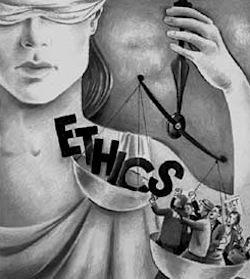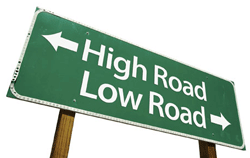The mad dash to mediocrity
 Neil Watt •
Neil Watt •  Wednesday, December 7, 2011
Wednesday, December 7, 2011 The new conduct rules for solicitors appear to be more notional than national ... Large Law Firm Group sets the tone ... It's all about what we can get away with ... The "right thing to do" went missing in action ... Neil Watt, who sat on the LCA's ethics committee, experienced a dashing of expectations
 South Australia has crossed the finish line; Queensland finished before them but nobody noticed; NSW hasn't really begun; Victoria is sitting on the starting line thinking about running; Tasmania doesn't want to run, but might join in later; WA boycotted the race; NT and the ACT are nowhere to be seen.
South Australia has crossed the finish line; Queensland finished before them but nobody noticed; NSW hasn't really begun; Victoria is sitting on the starting line thinking about running; Tasmania doesn't want to run, but might join in later; WA boycotted the race; NT and the ACT are nowhere to be seen.
That's where we are at the moment on the implementation of nationally consistent solicitors' rules.
Only South Australia has adopted the official Law Council endorsed Australian Solicitors' Conduct Rules (ASCR). No other jurisdiction can say with certainty when or if they will implement them.
You'd think it would be easy to agree on uniform ethical standards for Australia's solicitors.
That's what I thought three years ago when I sat with Law Society and Large Law Firm Group colleagues from around the land to begin the process of creating national conduct rules.
I'd like to say we were driven by a noble purpose, but the truth is we were driven by fear.
There was genuine concern that the Commonwealth's moves for national regulation of lawyers would see conduct rules pulled from the grasp of Australia's peak lawyer bodies, unless we got our act together and came up with something first.
So the Law Council convened a committee that eventually became the LCA Professional Ethics Committee.
I've always believed lawyers should set their own standards, for a couple of reasons.
As officers of the court lawyers must be independent of government. Also, professional standards can never be adequately imposed solely by rules. Ethics will only take hold when the profession itself takes responsibility for the behaviour of its members and places expectations on them to act ethically.
I had expectations too. I expected everyone around that table to be committed to the best of ethical standards free of self-interest. I expected members of an ethics committee to understand the importance of principle and to ensure the rules we wrote were based on the best of these. I expected us all to reach for something better than mere minimum standards. I expected us to ensure any interstate agreement didn't become an exercise in ethical compromise - a mad dash to mediocrity.
I discovered, after three years of battles over principle, that my idealism was misplaced.
There were fights over referral fees and whether lawyers could pocket them without client consent.
There were battles over allowing conflicts of interest and over whether the rules could set a standard higher than the minimum standards of common law.
There were full and frank discussions over what to do if a lawyer is called as a witness in their own client's matter.
Mostly we had battles over what the law would allow rather than what was the right thing to do. And there's the difference between ethics and law. Law states what we must do, while ethics is about what we ought to do.
 A committee charged with providing ethical leadership to the solicitors of Australia shouldn't be focussed on what we can get away with, but what is in the best interests of the profession and the people we serve.
A committee charged with providing ethical leadership to the solicitors of Australia shouldn't be focussed on what we can get away with, but what is in the best interests of the profession and the people we serve.
To do that effectively we have to divorce ourselves from self-interest, and there lies the rub.
Part of the problem is the representation on the LCA Ethics Committee. It's one thing for the Law Societies to be there - they can at least claim to be at arm's length from actual practice – but what about the Large Law Firm Group?
It was established to champion the commercial interests of national firms, which got a seat on the LCA by threatening to abandon the law societies and to take their employees with them.
This group stands to benefit directly from the decisions made by the Ethics Committee.
It's a classic conflict. On any other committee such a conflict would have to be declared yet, ironically, on the LCA Ethics Committee it was ignored.
This committee carries responsibilities that go far beyond those of the LCA's constituent members.
The ethics of the profession impact on its clients, on the courts and on public confidence in the entire legal system.
Wouldn't it make sense for the LCA Ethics Committee to embrace not only representatives of the profession, but at least one legal ethicist as well as someone to represent the courts (who have inherent jurisdiction), the clients and probably the regulators as well?
Then the rules might get beyond what lawyers must do and begin to reflect what we ought to do. On this issue the Law Council has shown little ability to be flexible.
So where do we find ourself now?
The Australian Solicitors' Conduct Rules were finalised by the LCA months ago and South Australia implemented them almost immediately.
The Queensland Law Society asked the Attorney General to "notify" them by October 1 and was turned down – giving the lie to the profession's much coveted control of its rules.
WA's regulator has written its own rules and won't implement the ASCR.
Tasmania isn't happy with the LCA's rules, but will consider adopting them once national regulation is in place -though WA and SA won't be a party to national regulation and Tasmania and the ACT have grave doubts about it.
NSW is conducting public consultation on the rules, which could result in amendments being sought.
Victoria is in a similar place to NSW, but again it's the regulator and not the LIV who has the final say, so who knows?
 Neil Watt: legal ethicistACT and NT Law Societies have made positive noises about the ASCR but still haven't adopted them.
Neil Watt: legal ethicistACT and NT Law Societies have made positive noises about the ASCR but still haven't adopted them.
Then there are the regulators, who have problems with the rules and are grumbling about seeking changes once "national" regulation is in place.
It's looking more notional than national - and I'm left wondering, for all my idealism, whether the profession's peak bodies really are capable of providing the kind of leadership needed in something as important as ethics.










Reader Comments